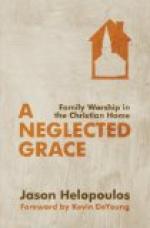We infer from the whole subject, that we should not murmur against God when afflicted, however great our bereavements may he. This does not, of course, forbid godly sorrow and tears. It is not inconsistent to weep; neither does sorrow for the dead, as such, imply a murmuring spirit. Christ himself invited to tears when he wept over the grave of his friend Lazarus. It is meet that we pay our tribute to departed kindred, in falling tears. These are not selfish; neither is the sorrow they express, a sin, nor an evidence of filial distrust, or of reluctant submission to the will of God. The unfeeling stoic may regard it such; but he outrages the generous impulses of humanity. Undefiled religion does not aim to cancel natural affection. Our piety, if genuine, will not make us guilty of crimes against nature, and prompt us to bend with apathy over the grave of buried, love. The mother of Jesus wept her pungent woes beneath the Cross; and the Marys dropt the tear of sorrowing love and memory at the mouth of his sepulchre. And shall we refuse the tribute of sorrow to the memory of those dear ones who sleep beneath the sod? To do so would, but unchristianize the deep grief which bereavement awakens, and which true piety sanctifies; it would unhumanize the very constitution of home itself. To be Christians, must the unnumbered memories of life be all without a tear? When we walk in the family grave-yard, and think of the loved who slumber there; when we open the family bible, and read, there the names of those who have gone before us, say, shall this awaken no slumbering grief, invite no warm, gushing tears, and not bear us back to scenes of tenderness and love?
Ah, no! The gospel encourages godly sorrow over the dead. We are permitted to sorrow, only not as those who have no hope, as not being cast down, and as not being disquieted within us. Such godly sorrow is refreshing, and the tears it sheds are a balm to the wounded spirit. They refine our sentiments, and beget longings after a better country. The memory of bereaved affection is grief. In traversing the past, our thoughts glide along a procession of dear events arrested by the tomb; and we become sad and weep. But this is not inconsistent with a confiding faith in God, nor with a meek: resignation to His afflicting providence. Faith was not designed to overpower a visible privation. When death enters our home we should feel pungently, though we have the faith of an angel, and weep before the smile of God. The evidences of faith, and the brilliant idealities of hope will hush the voice of murmur, and incite us to kiss the rod that is laid upon us.
It is, therefore, a Christian privilege to weep over the death of our departed kindred, yea, who can stifle the anguish of the heart when the tender flowers of home sink into the waxen form of death? when the flickering flame of infant life burns lower and weaker; when the death-glazed eye is closed, and the little bosom heaves no more, and that lovely form becomes cold as the grave, what parental heart can then remain unmoved, and what eye can then forbid a tear? Not even the assurance of infant salvation and the hope of reunion in heaven, can prevent sorrow for the dead.




